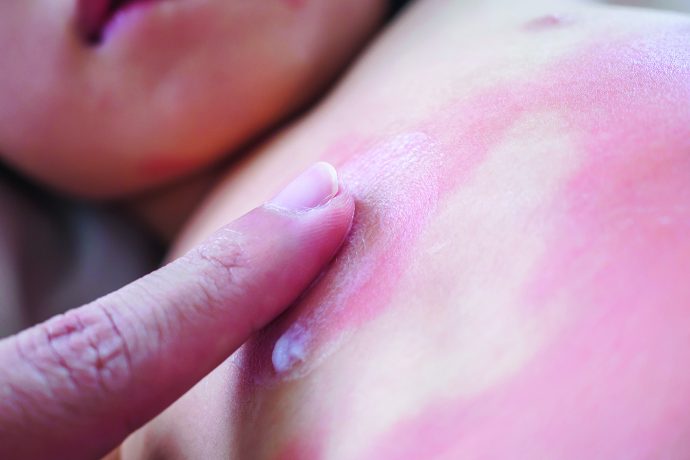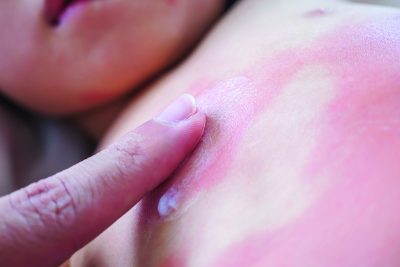Eczema refers to several skin conditions that cause red, itchy, and/or inflamed skin. It is fairly common during childhood, however, many children outgrow the condition by the time they are 5-years-old.
Atopic dermatitis is a term which some parents might be familiar with, but there are many other causes for eczema, and some conditions that even mimic eczema. For proper treatment and management, it is best to know the exact cause.
Looks like eczema
The phrase “same same but different” certainly applies here. Here are some types of skin conditions:
- Atopic dermatitis. The most common condition, usually present in people who have asthma. This condition degrades the skin barrier, leading to loss of moisture, allowing microorganisms to enter the body. While it usually occurs in infancy or childhood, it can start at any age.
- Contact dermatitis. Sometimes eczema develops due to repeated contact with certain substances which damages the skin barrier, e.g. chemicals, frequent hand washing, or certain metals like nickel. There are two main types: irritant contact dermatitis and allergic contact dermatitis.
- Seborrheic dermatitis. The most common condition among newborns and is frequently referred to as cradle cap. This condition causes thick, yellow and greasy scales on the baby’s scalp. Some babies may have widespread skin rash involving the folds especially around the diaper region.
- Papular urticaria. Caused by a reaction to insect bites, it is more common in children than adults as they have yet to be desensitised to insect bites. It may be caused by mosquitoes, fleas, mites, or any other household/garden insects.
- Discoid and nummular eczema. It appears as discrete, thick and itchy skin lesions that occur on the limbs. While its cause is unknown, it can be triggered by:
- Skin damage caused by insects, scrapes/scratches, or chemical ‘burns’.
- Inflammation (such as atopic dermatitis and/or statis dermatitis) on other parts of the body.
- Dry skin due to poor air humidity (e.g. air cond environment or winter season).
- Certain metals such as nickel.
- Pompholyx (also dyshidrotic eczema). This condition affects the hands/feet, leaving tiny blisters and causing irritation.
- Other skin conditions that are easily mistaken for eczema:
- Fungal infections. Typically caused by a fungus.
- Scabies. Skin infection caused by mites.
- Lichen simplex chronicus. Repetitive scratching/ rubbing can cause the skin to develop this condition, which is a chronic localised itch.
Treat that itch!
To determine the correct cause of his skin condition, check with your child’s paediatric dermatologist. The doctor can better advise you on proper treatment and management methods.
Finding out the cause involves determining your child’s itch triggers. Avoid exposing him to these itch factors to prevent discomfort and/or possible flare-ups. The doctor will advise you on what protocols to follow when it comes to bathing and moisturising.
Your choice of moisturiser matters too. Select products that are fragrance- and perfume-free (avoid unscented ones too as they may still contain ingredients that can irritate the skin), do not contain any dye or colouring, and opt for cream or ointment types instead of lotion.
Clinically-proven moisturisers offer longer lasting moisturisation, which prevents dry skin. The routine for treating eczema will differ depending on its severity and type, e.g. treatment for dry-skin will be very different from oozing sores.
Also, in the case of eczema-like conditions caused by insect bites, you will need to find and eliminate the cause. If the cause is bed bugs or dust mites, you will have to thoroughly clean, or replace affected bedding/clothing.
Remember not to jump to any conclusions that your child has atopic dermatitis just because it looks like it. As many skin conditions look like eczema, it is always best to get an expert’s opinion. The right diagnosis will ensure you are giving your child the right treatment.
An educational contribution by Malaysian Paediatric Association.
Read more: What Triggers Eczema







Comments